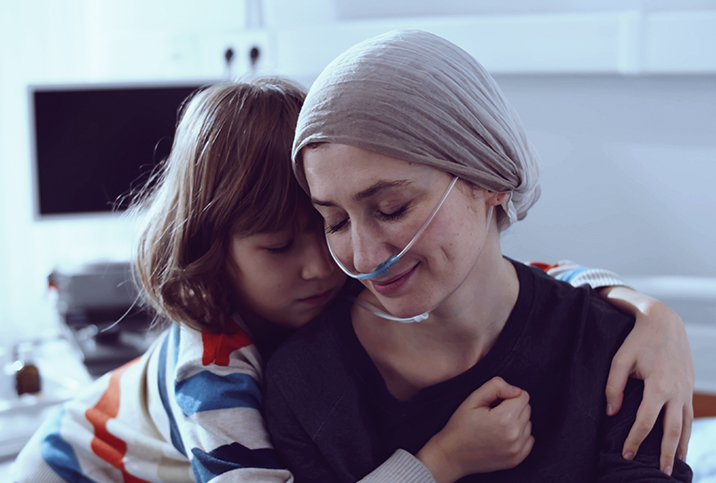Talking to Your Kids About Your Cancer Diagnosis

Receiving a cancer diagnosis can be overwhelming. A million thoughts and worries run through your brain. If you have children, one of those concerns is likely to be, "How do I tell my kids about my cancer diagnosis?"
Although a difficult conversation to have, it's an essential one. We spoke to a few experts to get their advice on talking to your kids about your cancer diagnosis.
Deciding to talk to your kids about cancer
Lisa Sevanick, L.C.S.W., an oncology social worker at NYU Langone's Perlmutter Cancer Center in New York City, said one of the key discussions she often has with parents is how to discuss their cancer diagnosis with their children. Some parents are reluctant.
"It's a natural parental instinct to protect the child, and they may be thinking it would be better to keep their cancer a secret. So I talk with people about why that's really difficult and not a good idea," Sevanick explained.
"I offer reassurance that with support and preparation, a parent can come up with what to say that gives an honest explanation, with even limited information being better than not discussing it or trying to cover it up," she said.
Children often know when something is different or wrong. Not explaining the situation may make them feel scared and alone. They may also jump to incorrect conclusions.
"So we encourage people to talk with children of all different ages, with more simple language for younger children and more detail for older ones," Sevanick said.
Opening up the conversation also allows your child permission to talk and ask questions about their worries. If you don't talk to your child about your cancer, they can feel excluded and unimportant. Sometimes they may even think the cancer is their fault or fear that the disease is contagious.
Talking about cancer may alleviate these feelings and stop misinformation. It builds a relationship of trust and could make you feel closer to each other.
How to prepare
Before talking to your child or children, you will need time to prepare. It's important to take time to cope with your own feelings and to understand the situation yourself. Cancer can be a whole new language to learn for everyone involved. You might want to speak to your healthcare provider, oncology social worker, counselor or a member of your cancer care team before talking to your children. There are lots of people and resources to help prepare you as much as possible.
"Be sure you have thought things through, balanced pros and cons, and found a place of some peace before sharing a medical diagnosis with others, especially children," said Alex Dimitriu, M.D., who is board-certified in psychiatry and sleep medicine and the founder of Menlo Park Psychiatry & Sleep Medicine in California and BrainfoodMD, a supplement company.
Plan what you are going to say so you feel more prepared. Sevanick explained that using the word "cancer" in the conversation is important. Children need information about the name of the cancer, where it is in the body, and your treatment.
It can become confusing if you try to gloss over the diagnosis with different words. It's best to be honest because children can find it hard to trust or believe you if they think you are hiding information from them.
Adapt the conversation to your child depending on their age and personality.
'We encourage people to talk with children of all different ages, with more simple language for younger children and more detail for older ones.'
"Know your audience, in both age and anxiety level," Dimitriu stated. "Even an anxious grandmother may not need to know all the details of a recent diagnosis. Your kids may need a watered-down version of what's going on. Older kids may be able to handle more details and potential risks/benefits of various interventions."
Practicing what you are going to say is also useful. You can talk it through with a healthcare professional or a family member. If you are in a two-parent relationship, plan your conversation and practice it together. Say it out loud or write it down—whatever helps you feel more comfortable.
"If you think you may appear sad or cry, let them know in advance so it doesn’t surprise them," Sevanick said. "It also teaches them it is healthy and important to express their feelings. It may also help a parent in preparation to recall past related family talks about other life challenges to draw wisdom from."
It's also good to think about the questions your children might ask so you feel more able to answer them.
"But if your child asks a question you can't answer, it's always OK to stop and just say something like, 'You know, that's such an excellent question and I'm not really sure I'm explaining it the best way, so let me ask my doctor or nurse and we can find out more about that,'" Sevanick advised.
It's OK not to know the answer to every question.
Using words your child will understand is essential so they don't become confused or misunderstand what's happening. For very young children, it could be as simple as saying, "Mommy is sick and needs to have some medicine." You don't have to address everything in one conversation; break it down into multiple talks.
It's more than one conversation
Sevanick explained that this is the first of what is likely to be many conversations with your children. Cancer is not always predictable, and you can only take it one step at a time. The language used should be tailored to age and unique factors about the child but also depends on the stage or severity of the illness.
"Your first conversation might just be explaining that you have cancer, where it is in the body, and how things might change," Sevanick said.
The discussion can often be very short and very basic, so don't feel you have to go into every detail initially. Give them little pieces of information, gradually building up a picture of your illness.
Try to keep the conversation focused on what you currently know. You can't and don't have to predict the future. If you know you are starting a treatment option that may cause side effects, such as hair loss, tiredness and feeling ill, you might want to talk about some changes your children may see.
Offer a lot of reassurance in general, but especially to younger children, and allow your child to ask questions. Sevanick advised that it can also help to ask an older child questions, such as:
- "What do you know about cancer?"
- "Is there anything you are worried about?"
- "Have you heard anything you want to talk about?"
You can reassure your children that you will answer their questions and update them when you know anything more.
Where possible, it's important to maintain your regular family routine, but let them know if there will be any changes. If you need to go to the hospital, how will that work? How is it going to affect them? Who's going to take care of them? Include your children in family decisions to help them feel more in control if possible.
Considerations for different age groups
"A cancer diagnosis can invoke fear in anyone," Dimitriu said. "A lot of this has to do with the maturity of your child and their own psychological makeup."
Some kids are born more anxious and prone to worry and nightmares, and it's essential to recognize that and treat them with appropriate care and protection.
"As kids get older, they may be better able to handle worry and also see things on balance rather than getting really upset or scared. A 5-year-old will react to fearful information much differently than an 8-year-old, and a teenager even more so," Dimitriu explained.
Some factors to consider for different ages include:
- Very young children don't really understand cancer. But remember, they can pick up on your emotions. They can also notice physical changes and changes in routine.
- Young children may have a basic understanding, but keep the language simple. At this age, they can worry that cancer is contagious or they have caused the cancer, so offer lots of reassurance that this is untrue.
- Older children may have more understanding. Keeping an open dialogue and ensuring they feel involved in decision-making can help.
- Teenagers might understand in more detail but might hear or read misinformation.
"Be careful if your child has access to the internet," Sevanick advised. "There is a lot of false and frightening information. Also, cancer treatment today is very specific to the individual, so what they read online might not be relevant to you."
Be positive but realistic
"Try to stay positive, for your own good and especially with younger children," Dimitriu said.
It can be helpful to use hopeful language about the doctor or treatment.
Sevanick recommended the following statements:
- "I have a new doctor who is very good at treating the type of cancer I have."
- "My doctor feels positive about my situation."
- "The surgery/chemotherapy/radiation will help me to get better."
Although remaining positive is important, try not to make any false promises.
"If you don't have all your diagnostic information or plan, I usually encourage people to wait unless there's an immediate need to tell the child something. You don't learn everything in one appointment," Sevanick said.
But if the cancer is progressing and the outlook changes, it is important to provide updated, honest information.
"And if things are worsening still and a parent might die, preparation and conversation are essential," Sevanick explained.
A discussion about possible dire outcomes can be much more difficult if left to the very end without any establishment or warning.
"Cancer can take away many things, but not a parent's ability to love, teach and communicate with their child," she said.
Remember, you're not alone
Even reading this article may seem overwhelming. But you don't have to embark on these conversations alone.
Ask a partner, family member or friend for support or to be with you when you talk to your children. Reach out to your oncology social worker or healthcare team for advice, or find a local or online support group where you feel comfortable talking about your situation.
"Reliable cancer organizations like Cancer Care or the American Cancer Society have excellent information and experts available. So across the country, if somebody doesn't have access to an oncology social worker where they're going to receive treatment, these and other national organizations have a lot of research and support behind the information. It's very accessible," Sevanick said.
Information on diagnosis, treatment and therapy for many different types of cancer is available on the Giddy website:
"Stay rooted in love," Dimitriu concluded. "Whatever the outcome, this can be a very powerful opportunity to focus on what matters most: our love for each other and our children. Give love a chance to overcome fear whenever possible."

















